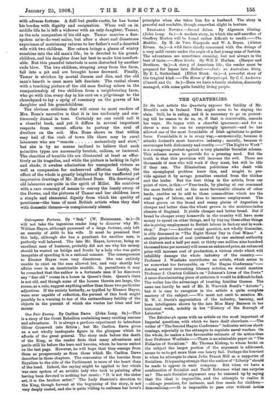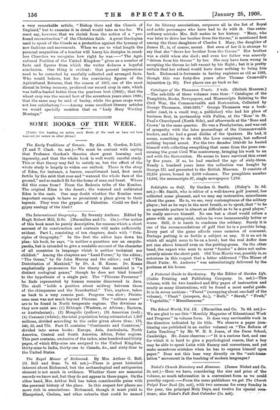THE QUARTERLIES.
IN its last article the Quarterly exposes the futility of Mr. Birrell's rule in Ireland. This might seem to be slaying the slain. Still, he is ruling, and it is necessary to go on protest- ing till he ceases to do so, or, if that is conceivable, amends his ways. He began with a cheerful ignorance—and for so clever a man he can be surprisingly ignorant—and he has allowed one of the most formidable of Irish agitations to gather force. Formidable it is in every way,—economically, because it attacks Ireland's most lucrative industry ; morally, because it encourages both dishonesty and cruelty.—" The Right to Work" is a courageous protest against a very plausible Socialist scheme. This scheme seems to provide for a pressing need. But the truth is that this provision will increase the evil. There are thousands of men who will work if they must, but will be idle if they can. The Elizabethan politicians who dealt with the unemployed problem knew this, and sought to pro- vide against it by savage penalties exacted from the shirker and the loafer. But the best thing in the article, from our point of view, is this :—" Free-trade, by placing at our command the more fertile soil or the more favourable climate of other lands, enables us to add to those commodities which are the real wages of labour, and thus to increase employment. The wheat grown on the broad and sunny plains of Argentina is cheaper and better than the wheat grown in the moisture-laden climate of England. It yields cheaper and better bread. But if bread be cheaper every housewife in the country will have more money to spend on other things, and by buying these other things she is giving employment to British labour in factory and in work- shop." Euge !—Another social question, not wholly dissimilar, is ably discussed in "The Eight Hours Day in Coal Mines." A smaller production of coal (estimated by one eminent authority at thirteen and a half per cent, or thirty-one million nine hundred thousandtons per annum) will mean an enhanced price, an enhanced price will increase cost of production, a vicious circle which will infallibly damage the whole industry of the country.— Professor J. Westlake contributes an article, which seems to us somewhat too favourable, on "The Hague Conference."— Among several interesting literary articles, we would mention Professor J. Churton Collins's on "Johnson's Lives of the Poets." A more discriminating piece of criticism it would be difficult to find. Tne writer has the advantage of treating familiar themes. The same can hardly be said of Mr. R. Warwick Bond's "Ariosto "; but it is easy to recognise in the article a quite oomplete mastery of the subject.—We must not omit to mention Mr. H. W. C. Davis's appreciation of the industry, learning, and keen intelligence shown by the late Miss Mary Bateson in her historical work, notably in her "History of the Borough of Leicester."
The Edinburgh opens with an article on the most important of Imperial questions, with which we have dealt elsewhere.—The writer of "The Second Hague Conference" indicates serious short- comings, especially in the attempts to regulate naval warfare. On the whole, he makes a less favourable estimate of its action than does Professor Westlake.—There is an admirable paper on "The Fallacies of Socialism." Mr. Thomas Kirkup, to whose books on the subject the larger portion of the argument is addressed, seems to us to get more than one heavy fall. Perhaps the heaviest is when he attempts to claim John Stuart Mill as a supporter of Socialism. It is passing strange that the author of "Liberty" should be made to appear in such company. But when we have a combination of Socialist and Tariff Reformer what can surprise us ? The anti-Socialist argument may be summed up by saying that the ideal is impossible, and the attempts to realise it —old-age pensions, for instance, and free meals for children- demoralising.—It is impossible to pass over without notice a very remarkable article, "Bishop Gore and the Church of England," but to examine it in detail would take us too far. We must say, however, that we shrink from the notion of a "pro- found reconstruction" of the Christian faith. A great theologian used to speak of the Creeds as a protection against the tyranny of new fashions and movements. When we see to what length the personal magnetism of a teacher will hurry his disciples in creed- less Churches we recognise how right he was.—" The Agri- cultural Position of the United Kingdom" gives us a number of facts and figures from which the writer deduces a hopeful conclusion. One thing is evident: that general impressions need to be corrected by carefully collected and arranged facts. Who would believe, but for the convincing figures of the Agricultural Returns, that the season of 1907, one of the most dismal in living memory, produced our record crop in oats, which was half-a-bushel better than the previous best (1902) ; that the wheat crop was the second best of the seventeen years since 1890; that the same may be said of barley, while the grass crops were not less satisfactory ?—Among some excellent literary articles we would specially mention that on "Lady Mary Wortley Montagu."





















































 Previous page
Previous page